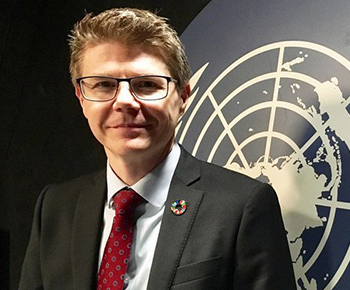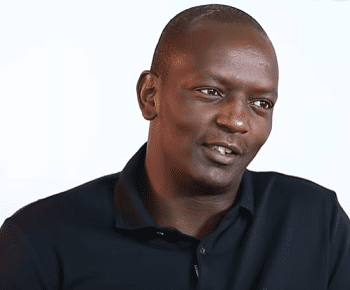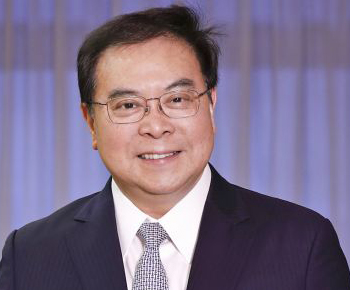- Safaricom focuses on using M-Pesa to transform lives with innovative solutions that focus on customer needs
- OCBC Bank uses technology to improve people’s ability to access knowledge, resources and advice
- Financial inclusion and solutions to climate change go together, according to the UNDP, as overcoming the digital financial divide builds resilience
Improving financial inclusion is an important part of the United Nation’s Sustainable Development Goals (SDG) and a key opportunity for financial institutions.
“Financial inclusion becomes an important part of resilience. The way people in the developed world use money and the choices they make as consumers have impacts that are felt beyond borders,” said United Nations Development Programme (UNDP) chief digital officer Robert Opp.
Two key trends that are surprisingly linked, shared Opp, are digital transformation and climate change. The link between financial inclusion and climate change, he added, is that people who do not have access to financial services tend to be more vulnerable.
He sees a digital divide developing, however, so it is important to overcome that divide by using smart business models that can extend services to people. “It’s in our interest as the United Nations to look at that global interconnectedness. The choices we make have an impact,” he added.

Robert Opp, United Nations Development Programme (UNDP) chief digital officer

Sitoyo Lopokoiyit, Safaricom, chief financial services officer
The key is to focus on the needs of individuals and the challenges they have, Opp said, and how to use technology to meet their needs. M-Pesa, blockchain, aid transfers, remittances and cash cards all use innovative approaches to address problems. Thinking about how people make payments to government, for example, the key is to determine how to create the ecosystem and develop more efficient and effective ways of interacting with the financial system. As people have more access to financial services, they build further resilience, noted Opp.
Transforming lives
To make sure the fintech revolution benefits the many, M-Pesa – a mobile money transfer service in Kenya – focuses on the purpose of the innovation and how it will impact the people, shared Sitoyo Lopokoiyit, chief financial services officer at M-Pesa’s parent company Safaricom, a leading communications company in Kenya.
Customer acquisition has evolved from the traditional method of filling out forms to being digital, for example, with 25 million bank accounts all opened digitally. For savings and lending propositions, Safaricom enables customers to save and to leverage savings-led credit propositions.
“We lend about $50 million on a daily basis, with NPL below 2%,” shared Lopokoiyit. Safaricom is also focused on achieving UN SDGs relating to international money transfers, with the cost to customers for remittances of 2% being far less than the global average of about 10%.
Lopokoiyit said that the success of M-Pesa is due to several factors. One is a deep passion as an organisation for transforming lives, second is investment. M-Pesa has more than 175,000 agents and connects to all banks in Kenya. It is also an open platform with open APIs that serves more than over 200,000 businesses and with 16,000 developers using the platform.
“We invest over $300 million a year in enhancing the network and $40 million in system scalability,” said Lopokoiyit.
The company also works to make sure no one is left behind. As one example, it partnered with a South Korean company for a braille watch and voice services, resulting to around 400,000 visually impaired customers now using M-Pesa.
M-Pesa is also working to ensure that refugees, such as the one million refugees in Kenya, have access to financial services. It is also heavily invested in financial education and uses its agent network as well as technology to monitor fraud, ensure there is systems security and make sure that customers are not duped.
At present, M-Pesa processes about 30 million transactions daily and has $10 billion in monthly transactions and accounts for well over 50% of gross domestic product in Kenya.
Digital delivery of financial education and advice
OCBC Bank was formed, shared group CEO Samuel Tsien, to transform people’s lives and help people grow. To do that now, he said, “We follow the trends and new inventions, such as technology. We will deploy technology not only with profitmaking in mind (but also considering) people’s ability to access knowledge, resources and advice. By making use of the availability of data being digitalised, we help people understand themselves better.”

Samuel Tsien, OCBC Bank, CEO
The bank works to make sure that the community and the people it serves are not left behind. While some people are technology-savvy and knowledgeable, he noted that there are also people who are not knowledgeable or savvy. “We deploy technology to people who are able to use it or make sure we reach out to them and teach them.” The bank supports educational access for children who do not have the capacity to attend school. It also teaches financial literacy to their parents.
When OCBC looks at financial innovation, Tsien said, its objective is to make its products and services more productive and efficient. With payments, for example, the goal is to make “systems more efficient so that cash becomes unnecessary. Deploying fintech is trying to make our efforts more productive. The bank is then able to devote the resources that become available to something else.”
To increase efficiency and avoid duplicating efforts, OCBC is working together with other banks to create a utility and perform know your customer once, particularly for commercial entities. “We are working together to deliver something which is good for the industry. That’s an example of how we make use of technology,” Tsien said.




All Comments